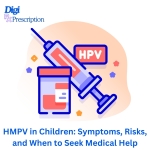
HMPV in Children: Symptoms, Risks, and When to Seek Medical Help
Human Metapneumovirus (HMPV) is a common respiratory virus that primarily affects children, causing mild to severe respiratory illness. While it often presents with cold-like symptoms, HMPV can pose serious risks, especially for young children, infants, and those with weakened immune systems. Here's everything parents need to know about HMPV, how to recognize it, and when to seek medical attention.
What is HMPV?
HMPV, or human metapneumovirus, is a respiratory virus first identified in 2001. It belongs to the same family of viruses as RSV (respiratory syncytial virus) and causes similar illnesses. It spreads through respiratory droplets when an infected person coughs, sneezes, or touches surfaces.
Children are particularly vulnerable to HMPV, especially during late winter and spring, when infections are most common.
Symptoms of HMPV in Children
The symptoms of HMPV can range from mild to severe, depending on the child’s age and health condition. Common symptoms include:
-
Mild Symptoms:
- Runny or stuffy nose
- Cough
- Fever
- Sore throat
- Fatigue
- Decreased appetite
-
Severe Symptoms (in high-risk children):
- Wheezing
- Difficulty breathing
- Rapid breathing
- Bluish lips or skin (a sign of low oxygen levels)
- Persistent fever
Who is at Risk?
While most children recover from HMPV without complications, certain groups are at a higher risk for severe illness:
- Infants and toddlers (under 2 years old)
- Premature babies
- Children with asthma or chronic lung conditions
- Children with weakened immune systems
- Children with heart conditions
How HMPV Spreads
HMPV spreads through:
- Direct Contact: Touching an infected person’s hands or face.
- Respiratory Droplets: Being exposed to coughs or sneezes.
- Contaminated Surfaces: Touching objects like toys or doorknobs and then touching the mouth, nose, or eyes.
The virus can remain infectious on surfaces for hours, making hand hygiene crucial to prevent its spread.
Complications of HMPV in Children
In severe cases, HMPV can lead to complications such as:
- Bronchiolitis (inflammation of the small airways in the lungs)
- Pneumonia
- Respiratory failure, requiring hospitalization
- Ear infections
These complications are more common in infants and children with underlying health issues.
When to Seek Medical Help
It’s essential to monitor your child’s symptoms closely and seek medical attention if you notice any of the following:
- Persistent high fever that doesn’t respond to medication
- Difficulty breathing or rapid breathing
- Bluish tint around the lips or face
- Signs of dehydration, such as dry mouth, no tears when crying, or fewer wet diapers
- Lethargy or extreme fatigue
- Persistent coughing or wheezing
In severe cases, hospitalization may be required to provide oxygen, fluids, or other supportive care.
Preventing HMPV in Children
Although there is no specific vaccine or antiviral treatment for HMPV, these steps can help reduce the risk of infection:
- Practice Good Hand Hygiene: Encourage frequent handwashing with soap and water for at least 20 seconds.
- Avoid Crowded Places: Limit your child’s exposure to crowded indoor spaces during peak seasons.
- Disinfect Surfaces: Regularly clean toys, doorknobs, and other frequently touched objects.
- Keep Sick Children Home: If your child shows symptoms, keep them away from daycare or school to prevent spreading the virus.
- Teach Respiratory Etiquette: Encourage children to cover their mouth and nose when coughing or sneezing and to use tissues or their elbow.
Treatment for HMPV
There is no specific antiviral treatment for HMPV. Supportive care focuses on relieving symptoms:
- Use a humidifier to ease breathing.
- Keep your child well-hydrated.
- Use over-the-counter fever reducers like acetaminophen or ibuprofen (consult your pediatrician for proper dosage).
- Ensure plenty of rest.
For severe cases, hospitalization may be required for oxygen therapy, intravenous fluids, or close monitoring.
Conclusion
HMPV is a common respiratory virus that most children recover from with minimal intervention. However, parents should remain vigilant, especially if their child is at higher risk for severe complications. By recognizing the symptoms, practicing good hygiene, and seeking timely medical care, you can help protect your child and prevent the spread of HMPV
